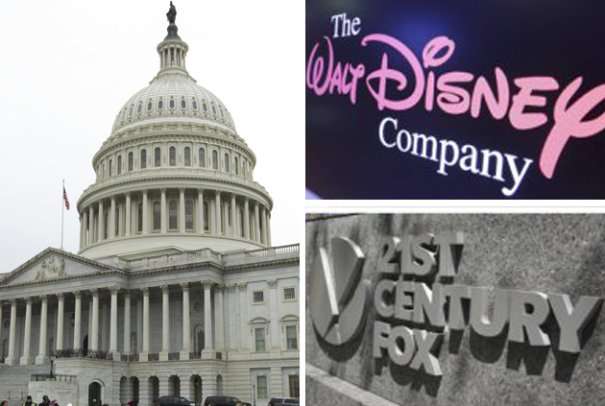As analysts and legal experts mull how the Trump administration’s Department of Justice might treat Disney’s planned acquisition of 21st Century Fox’s entertainment assets, a leading Democrat on the Senate’s antitrust oversight committee is calling for hearings on the proposed merger.
Sen. Amy Klobuchar (D-MN), the ranking Democrat on the Senate subcommittee, requested a hearing on the proposed mega-deal, echoing concerns voiced by advocates who worry the $66 billion deal would concentrate too much power in the hands of a single Hollywood studio, and result in consumers paying higher prices for entertainment.
“I’m concerned about the impact of this transaction on the American consumer,” said Klobuchar.
Other Democrats are similarly calling for Congress to play an oversight role including Rep. David Cicilline (D-RI), who serves on the House Judiciary Committee, and Rep. Frank Pallone Jr. (D-NJ), the ranking Democrat on the House Energy and Commerce committee.
Disney is expected to position its acquisition of a rival film and television studio as a defensive move, fortifying the media conglomerate against new, powerful Silicon Valley competitors and shifting distribution models.
“Disney is saying we need more clout because we’re losing leverage to the Netflixes and Amazons and Googles,” said Larry Downes, an antitrust expert and a fellow at the Georgetown McDonough School of Business. “When it’s a defensive deal, antitrust should encourage it — because you’ve got a competitor that’s becoming weaker.”
One area likely to receive scrutiny, say analysts and legal experts, is Disney’s plans to add Fox’s 22 regional sports networks to its top-rated sports network, ESPN.
The combination would create a formidable live sports lineup: ESPN, with its 88 million subscribers, holds rights to professional football, basketball, baseball games. Fox’s regional sports channels counts 61 million subscribers and carries local coverage of 44 professional baseball, basketball and hockey teams.
Jonathan Barnett, director of the USC Gould School of Law’s Media, Entertainment and Technology Law Program, said the deal — which excluded Fox’s national sports networks, FS1 and FS2 — appears to have been structured with antitrust considerations in mind.
Still, adding such must-have local sports programming, and popular cable offerings like FX Networks, to Disney’s portfolio would give it unprecedented leverage in negotiations with pay TV providers, said BTIG media analyst Richard Greenfield.
“Ultimately, the real losers will be consumers who are forced to buy bigger channel bundles — including more and more unwanted networks — at higher prices,” Greenfield wrote. “Why would the government allow the biggest programmer ‘bully’ to grow significantly stronger?”
That’s the issue Public Knowledge’s senior policy counsel, Phillip Berenbroick, raised as the Disney-Fox deal was announced: that Disney would have the power to increase costs for consumers by demanding higher prices from cable, satellite and Internet TV distributors. Disney also would be in a stronger position to demand inclusion of their programming in the cable bundle — potentially excluding smaller independents.
“You have the potential to not only drive up the cost of the package,” Berenbroick said. “One of the concerns we’ve raised in other merger contexts, Time Warner-AT&T and others, is the diversity and availability of independent programming.”
Another area likely to receive attention is Disney’s commanding 40% share of the domestic box office — and its impact on the exhibitor community. (Last weekend, the market share for Disney and Fox reached an absurd 90% as Star Wars installment The Last Jedi exploded onto the scene.) Disney could rationally argue that, despite commanding a big chunk of ticket sales, that’s not necessarily harmful — especially when the movie theater is just one place where audiences watch movies these days.
Disney’s controlling interest in the streaming service Hulu is a final area that could attract a regulatory review, though experts expect the media giant will argue this will benefit consumers.
“An important mitigating factor here is that Hulu is in third place in the premium streaming market, lagging considerably behind Netflix and Amazon,” said USC’s Barnett. “A more robust Hulu platform could actually be viewed as pro-competitive.”

Pulagatha on December 19th, 2017 at 09:11 UTC »
Can Disney keep what they want and spin the rest off into a separate company that is unaffiliated?
guayaba7 on December 19th, 2017 at 07:18 UTC »
The most alarming part of the article is that Disney is framing the sale as a defensive measure against Amazon, Google, and Netflix. They're making a case that the Disney/Fox deal is actually an anti-trust measure itself because it's bolstering a weak competitor among a powerful field.
If that's true then what hope is there for the other studios without a majority stake in a streaming service?! I guess WB-ATT and Comcast-Universal would be ok, but that doesn't sound good at all for Paramount and Sony...
Does Disney see the writing on the wall and they're just trying to stay alive among Google and Amazon? That's a twist I never considered, I was just focusing on Disney among movie studios but I guess there's another level here where corporations are playing for the future of entertainment.
jed313 on December 19th, 2017 at 05:20 UTC »
I’m glad to hear it. This unsettled me. Kinda like how Ticketmaster controls basically every concert you want to see, I’m not OK with one company controlling nearly 60% of every movie you watch (along with all the TV properties)